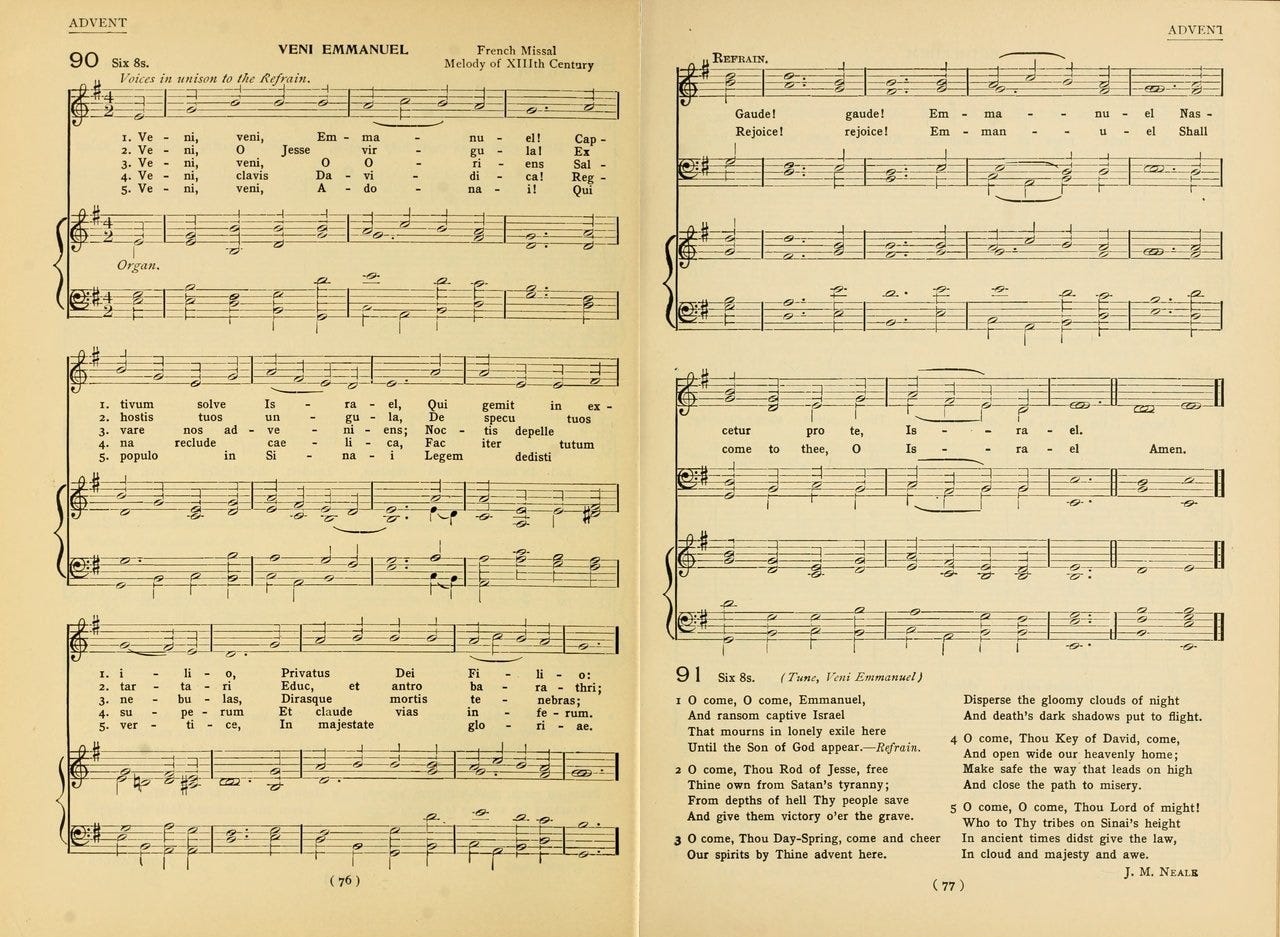The hymn which is most distinctly associated with the holy season of Advent, apart from the Christmas carols which are often popularly played during this time outside the context of the Mass, is “O Come, O Come, Emmanuel,” also known by its original Latin title, “Veni, Veni, Emmanuel.” This is a very ancient song, derived from monastic practice in Carolingian times (8th-9th centuries), when monks and nuns would recite seven of the plainchant “O Antiphons” on the last seven days of Advent, culminating in the eighth antiphon, “O Virgo virginum,” being sung on Christmas Eve before and after the chanting of the Magnificat.
This hymn is an amalgamation of the O Antiphons, with each verse paraphrasing one of them. The Latin metrical form of the hymn dates from the 12th century while its familiar tune was originally used as a 15th-century Processional for French Franciscan nuns. It became especially influential through the German Jesuit hymnal, Psalteriolum Cantionum Catholicarum, where it first appears in print in the 1710 seventh edition. It then became standard by its use in Jesuit schools throughout the eighteenth and nineteenth centuries.
The hymn’s subcreative use of the O Antiphons is out of order, with its title being taken from that of the final antiphon, “O Emmanuel.” It also includes an added refrain not found in the antiphons: “Gaude, gaude! Emmanuel / nascetur pro te, Israel (Rejoice, rejoice! Emmanuel / will be born for you, O Israel).” One reason for this altered scheme is to highlight the liturgical riddle contained in the first seven O Antiphons:
O Sapentia
O Adonai
O Radix Jesse
O Clavis David
O Oriens
O Rex genitium
O Emmanuel
Together, the first letters of each antiphon form the acrostic SARCORE, which, if read backwards, spells out “Ero cras,” or “I will be present tomorrow.” The chanting of the “O Emmanuel” on the night before Christmas Eve thus solves the riddle, which will then be spelled out even more explicitly in the “O Virgo virginum” on Christmas Eve: God is come to us in Jesus Christ through the immaculate womb of the Blessed Virgin Mary.[1] Therefore, let us rejoice!
Each antiphon, and its paraphrase in the “Veni, Veni, Emmanuel,” gives us a clue to the identity of Christ, with all of them coming from the Old Testament, just as the prophets and Our Lord Himself made the mission and the divinity of the Messiah a mystery which requires our free cooperation in God’s gifts of love and wisdom to unveil: Christ is the Wisdom of God, the selfsame Lord of Israel, the root of Jesse, the key of David’s Kingdom, the Morning Star and Light of the East “which enlighteneth every man that cometh into this world” (Jn 1:9), the King not only of Abraham’s seed but of all the nations, and finally God-with-us, the fulfillment of all man’s hopes and the salvation of the world.
During this blessed season of Advent, may we remember Christ’s first coming at the Annunciation, when He was conceived in the womb of the Virgin, then the eucatastrophe of His indwelling with His birth in Bethlehem, foretold by the prophets and recognized by the angels, the humble shepherds and Creation itself, while also opening our own hearts to Christ and preparing ourselves for His Second Coming in power, majesty and judgment at the consummation of history.
1. Veni, veni Emmanuel!
Captivum solve Israel!
Qui gemit in exilio,
Privatus Dei Filio. [7th antiphon]
Gaude, gaude, Emmanuel
nascetur pro te, Israel.
2. Veni o Jesse virgula!
Ex hostis tuos ungula,
De specu tuos tartari
Educ, et antro barathri. [3rd antiphon]
3. Veni, veni o Oriens!
Solare nos adveniens,
Noctis depelle nebulas,
Dirasque noctis tenebras. [5th antiphon]
4. Veni clavis Davidica!
Regna reclude coelica,
Fac iter Tutum superum,
Et claude vias Inferum. [4th antiphon]
5. Veni, veni Adonai!
Qui populo in Sinai
Legem dedisti vertice,
In maiestate gloriae. [2nd antiphon]
(English - 1881)
O come, O come, Emmanuel,
And ransom captive Israel;
That mourns in lonely exile here,
Until the Son of God appear.
Rejoice! Rejoice! Emmanuel
Shall come to thee, O Israel.
O come, Thou Rod of Jesse, free
Thine own from Satan's tyranny;
From depths of hell Thy people save,
And give them victory o'er the grave.
Rejoice! Rejoice! Emmanuel
Shall come to thee, O Israel.
O come, Thou Day-Spring, come and cheer,
Our Spirits by Thine Advent here;
Disperse the gloomy clouds of night,
And death's dark shadows put to flight.
Rejoice! Rejoice! Emmanuel
Shall come to thee, O Israel.
O come, Thou Key of David, come
And open wide our heavenly home;
Make safe the way that leads on high,
And close the path to misery.
Rejoice! Rejoice! Emmanuel
Shall come to thee, O Israel.
O come, O come, thou Lord of Might
Who to Thy tribes, on Sinai's height,
In ancient times didst give the law,
In cloud, and majesty, and awe.
Rejoice! Rejoice! Emmanuel
Shall come to thee, O Israel.
[1] https://www.umcdiscipleship.org/resources/history-of-hymns-o-come-o-come-emmanuel




